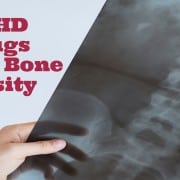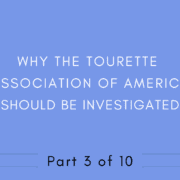Functional Psychiatry for ADHD, Tourette Syndrome, and OCD
Interview by Sheila Rogers, MS, Director ACN
Would you briefly describe your practice and clientele?
I’m board certified in child and adult psychiatry, and have seen over 10,000 children with the conditions you focus on in Latitudes. For many years, I saw those children with the most severe problems-such as depression, autism, and Tourette syndrome (TS). More recently, while in private practice, the majority of youngsters I’ve treated have had attention deficit disorder/hyperactivity (ADD or ADHD) or school-related learning and behavior problems. In our practice we see many neurologically impaired patients. Over the years, my practice has changed from primarily a psychopharmacologic practice to a functional psychiatric practice.
What is functional psychiatry?
Functional psychiatry looks at patients metabolically, and utilizes nutrition rather than relying solely on medications. For me, this shift represents a gradual change over the last ten years. The work is based on an understanding that mental illness and many neurological conditions are due to metabolic disturbances that affect the neurochemistry of the brain. These conditions can include exposure to toxic substances, allergic responses, infections, environmental stresses, and dietary factors. Most individuals have genetic vulnerabilities that result in a disease state that can be aggravated by these triggers. My practice focuses on looking at metabolic causes for the presenting symptoms.
How do you determine those metabolic causes — by symptoms, history, or lab testing?
It’s hard to determine solely by history, because youngsters with ADHD or children with TS could have similar symptoms, but the underlying problem could be very different. That’s one reason it’s difficult to study these conditions — there can be so many different causes or combinations of causes. Most of my practice involves interpreting metabolic tests to determine possible biochemical mechanisms contributing to the individual’s symptoms.
What types of metabolic lab tests are you referring to?
Individual lab tests are recommended after obtaining an extensive history. We frequently include hair analysis and tests for heavy metals, particularly copper. We often find elevated copper levels for both TS and ADHD. Fatty acid analysis is done by Body Bio — blood work gets sent to Johns Hopkins. Patricia Kane, PhD, at Body Bio provides a computerized analysis that’s quite good. Also, I often recommend a food allergy screen and blood tests that aren’t routinely done, such as thyroid testing, B12 and folate levels. The standard profile for ADHD we’ve used has included fatty acid analysis, a food allergy screen, and a complete chemistry profile. An analysis of urinary organic acids analyzed by Great Plains Laboratory under Dr. William Shaw can also be extremely helpful.
Do you use different approaches for ADHD, TS, autism, or obsessive-compulsive disorder (OCD)?
The metabolic overview is similar for all of them, but some of the things we are finding differ dramatically. It’s very difficult to make generalizations. I essentially use the same approach to testing for all of them. Again, I see elevated copper in a lot of the TS kids and some ADHD youngsters, as well as food allergies in each of the conditions you mentioned.
How do you approach treatment? Do you recommend nutritional supplements?
Making dietary changes produces significantly better results than simply using supplements. With food allergies, if you eliminate the offending foods you can see dramatic changes. If I can change the intake of processed foods and sugars, I can also elicit change. Reducing the intake of carbohydrates in general — more so in OCD — and increasing protein and good fats and oils can also be helpful.
Do you have any other comments on OCD? Are you seeing an increase in this condition?
I am seeing an increase in the number of children with OCD coming to our clinic. There is ongoing research in the role strep infection plays in this condition. Treating OCD can be more challenging than treating ADHD, but usually we can get enough improvement that these children don’t need medicine. We use the same type of lab testing, and finding a host of nutritional deficiencies is not uncommon. Although I do not know the mechanism involved, a key factor in many of the cases of OCD seems to be high carbohydrate intake. Some of these youngsters are what I refer to as “carbo addicts.” When the parent can make dramatic changes in consistently reducing carbohydrate intake, we often see improvement. Of course, every case is different. I am particularly excited about the results we are getting with inositol in the treatment of OCD. There is very good scientific research to support this. I recommend this prior to any medication trials.
I recently heard from a parent whose child was exhibiting significant symptoms of OCD. The mother explained that the young girl refuses to eat most foods presented to her — she is consuming a limited diet that focuses on breads and milk products. The girl complains that she doesn’t like the texture of other foods in her mouth.
I believe this situation is related to nutrient deficiencies that affect the taste for foods and the interest in foods. People who have low zinc levels tend to not have an appetite. A healthier appetite leads to interest in a wider range of foods. So one of the things we do is encourage parents to cook nutritionally better foods, buy nutritionally better foods, and provide whole food, supplements. Some kids can be very fussy eaters, and the challenge lies in expanding their dietary intake to include a wide range of foods.
You mentioned elevated copper levels. How do you treat that condition?
For someone with high copper levels, the treatment primarily involves the use of supplements. It depends on how high the copper level is, in addition to other factors, but typically we use oral supplements: vitamin C, lipoic acid, zinc, and manganese, for example. These can help the body excrete copper. Treating children with elevated copper levels can take a lot of time and may include multiple interventions.
Have you had success with Tourette syndrome?
Yes. Most of the youngsters I have seen with TS have the triad of TS, ADHD, and OCD. With some patients, just eliminating foods they were sensitive to improved symptoms. Some with ADHD responded to a high protein diet, fatty acids, and supplements.
When you talk about eliminating foods, what are some of the most common foods that are problematic? Do you see the same ones coming up over and over, or is it patient specific?
It varies. Milk and wheat are certainly the most common — in overwhelming numbers, I would say. But we’ve seen everything. A dietary approach is usually not easy if the kids are consuming a typical American diet. The problem for some of these kids is that they are allergic to so many different foods that it doesn’t help to eliminate just one or two of them. In these cases we need to be more aggressive and not only have a change in diet, but look at environmental allergies as well. While some literature advises that children should eliminate a given food for eight to twelve weeks, I find it more effective to recommend that after six to twelve months they can begin introducing the offending food in small amounts. Utilizing pancreatic enzymes and probiotics can be very helpful with those children with complicated food allergies.
I’ve read many reports on OPC as a recommended supplement for ADD. Could you comment on this?
OPC stands for oligomeric proanthocyanidins, a phytochemical and bioflavanoid contained in apples, berries, raspberries, blackberries, grapes, many red wines, and pine bark extract. Many of your readers may be familiar with Pycnogenol™, which is a pine bark extract. I don’t usually recommend Pycnogenol in my practice because it tends to be expensive for the dosage needed. What we use is a combination of grape seed and pine bark. We’ve found OPC to be very helpful for adults who have attention problems. As we started investigating this, we found it can also help many children-more in areas related to distractibility and inability to sustain attention than for hyperactivity.
The Journal of the American Academy of Child and Adolescent Psychiatry had an article a few months ago on using OPC for ADHD, and they published my response. The fact that there was an article on nutritional supplementation for ADHD in that journal is significant. OPC is thought to be twenty times more powerful than Vitamin C, and 50 times more powerful than Vitamin E. It works effectively in reducing or repairing free radical damage. Free radicals are considered to be an underlying cause of many diseases. If the effects of free radical damage can be neutralized, the body has a better chance of healing itself.
ADD or ADHD are syndromes with complex, multiple causes. The conditions can be very disruptive to psychosocial development, and we need to be looking at a variety of approaches to address the variability of symptoms and causes. OPC is an antihistamine, and it enhances the capillary blood vessel function. This can improve the efficiency of the blood brain barrier. We’ve done studies that show OPC decreases theta brain wave, which is the daydreaming brain wave. This improves the ratio of theta to beta waves in kids with ADHD. The beta wave is the “attention” brain wave. While there are no formal studies on the use of OPC for ADHD, reports of its usefulness in improving brain function and ADHD symptoms in some children have been circulating for many years, although we don’t know the mechanism by which this occurs.
What can you tell us about NADH?
This coenzyme is currently being researched for use in Chronic Fatigue Syndrome and Alzheimer’s disease. It’s also being used for ADHD, hypertension, and Parkinson’s disease. NADH helps to energize brain activity, and can improve alertness, concentration, emotions, drive, and overall mood. I have used it effectively with children over the age of 12. Younger children may exhibit increased agitation with its use. It is important to check with a physician before administering it. Good references for more information are in The Energizing Coenzyme and Energy for Life, by Dr. George Birkmayer.
Do you use biofeedback?
EEG biofeedback is often included as part of our treatment. I don’t have as much experience with it for TS and OCD, though I would like to pursue its use further. I use it mostly for ADD/ADHD and anxiety. For anxiety, EEG biofeedback operates as a kind of high-tech yoga. The client can visually observe when they are relaxing and get immediate feedback. I got involved in the field over eight years ago, and it’s exciting. The drawback is the time involved. It typically takes at least 40 sessions, and at $50 to $100 a session, it’s expensive. It would be ideal if it could be used in the schools, as it needs to be done about three times per week.
As I mentioned earlier, theta waves are associated with daydreaming and inattentiveness, and beta waves are associated with concentration and focus. Studies show that youngsters with ADD have an abundance of theta waves, and a diminished level of beta waves. EEG Biofeedback sessions can help individuals learn to produce beta waves, thereby improving their concentration.
We’ve been able to show that with nutritional supplements like OPC, and by treating other nutritional deficiencies, we can change the theta/beta ratios more quickly than with biofeedback alone. After all, if the brain is not functioning optimally due to nutritional deficits, it is hard to train! When it is receiving all the nutrients it requires, biofeedback can be even more successful.
When you talk about fatty acids, what supplements are you referring to?
One thing is important to understand. As we started doing testing, including fatty acid analysis in children — and we have done hundreds — we’ve learned that everyone is very different. It’s not possible to make supplement recommendations based on the disorder alone. One concern that we started seeing when the dietary supplement Efalex came out and people started pushing fish oil, was that a lot of parents who started giving their kids omega-3 fish oils were actually creating fatty acid imbalances. Now, because the body does not produce essential fatty acids, it’s critical that they be provided through diet. Both omega-6 and omega-3 oils are needed. Omega-6 is found in raw pumpkin seeds, sunflower seeds, walnuts, almonds, and pecans. Good sources of omega-3 are flaxseed oil and fish oil. A combination of both types of oils is found in dried beans: kidney, red, pinto, and soybeans.
Supplements can also be helpful, but without adequate testing, they can cause problems. Testing children provides useful guidelines for supplementation. If I test someone with ADHD and they have high levels of omega-3, they shouldn’t be given any fish oil. We have found that most children with ADHD have low levels of omega-3 fatty acids, but not all! Fatty acids by themselves are not the answer; other kinds of nutrients are essential as well. Families need also to be aware of the benefit of reducing intake of the “bad” fats, the trans-fats. These are produced through hydrogenation, when liquid vegetable oil is made solid. This process alters the molecular structure of the fats, and trans-fatty acids have been linked to the development of diseases. In particular, these fats can interfere with insulin receptor function, making insulin less effective. They have also been associated with low birth weight, inferior breast milk quality, immune dysfunction, and diabetes, among other things. If labels indicate hydrogenated or partially hydrogenated vegetable oils, they have been made with trans-fats, and the items should be avoided as much as feasible. Typical foods include items such as commercial French fries, doughnuts, shortening, chips, microwave popcorn, and ranch salad dressing.
Have you seen, or would you predict, any common nutritional deficiencies for Tourette syndrome?
I think it is critical to understand how incredibly complex the brain is. The symptom of a tic is related to dopamine, yet the possibilities of all the syndromes that are interacting to create the dopamine dysfunction are more complicated. Just from the cases I’ve seen, I know people who have taken vitamins, followed a good diet, and the tics have improved. Others have had to eliminate milk, and then the TS symptoms have subsided. Others have had elevated copper, and when the copper level came down, they improved. The list can go on. The fact that there are so many different contributing factors is probably why the Tourette professional community hasn’t been too supportive in researching a nutritional approach. How can you do a study that focuses on just one factor when there are multiple possible causes?
For example, if a study is done for the relationship between copper levels and TS, there might only be one or two kids included in that study who have high copper levels. So the conclusion of the study might be that elevated copper levels have no influence on TS, because results were inconsistent. Yet, for the individuals involved, copper levels were the most important factor! Those are the kids who get lost.
The same could be said for a study on ADHD that singles out sugar as the only variable. Similarly, there is not a single diet that is appropriate for everyone. Everybody is metabolically different, and different metabolisms do better with different types of diets. One child might do well on a vegetarian diet and a high carbohydrate diet, and another child may need more protein.
It’s important for parents to recognize differences in children. They need to look beyond just physical appearance and how kids act and play. They need to observe how kids respond to what they eat! Parents should also focus on providing their children with nutrient-dense, whole foods. The more they can do that now, the easier it will be for the children as they get older.
Many of our readers are dealing with rage, mood swings, anger, and depression in their children.
Let me stress that my roots are still in psychopharmacology. A family may come to me for herbs, and they may leave with a prescription for medication. Nutritional interventions can take three to four months. A child who is depressed or is out of control may need a medication.
However, there are other approaches I would recommend in addition to the medication. For a child who has mood swings and rage, I would think about carbohydrate sensitivity and blood sugar fluctuations; high copper levels; food allergy — and this can include anything from cucumbers to ketchup; deficiencies in essential fatty acids; and trace mineral deficiencies.
Have you recommended St. John’s wort for depression?
I used to use it a lot. Not as much now, as my work involves looking for underlying causes of depression. It’s important for people to recognize that St. John’s wort has a significant effect on physiology. I’ve seen side-effects as well as improvement. Using St. John’s wort may provide some relief symptomatically, but it is not addressing the cause. Many of the youngsters I see have not responded to St. John’s wort. I do use it and recommend it, but thinking, “Oh, this is natural so it’s okay” is the wrong approach.
We know that the incidence of depression among young people is increasing, and the age of onset is decreasing. I believe this increase may be directly related to diet, particularly fatty acid imbalances. Sometimes just getting nutritious food into these youngsters can make a difference. I also use 5-HTP.
What is 5-HTP, and is it useful for bipolar disorder as well as depression?
5-HTP is a nutritional supplement found in most health food stores. 5-HTP is short for 5-Hydroxytryptophan. It is made from the amino acid tryptophan and is used to create serotonin. As you know, serotonin is a neurotransmitter in the brain. The most common antidepressants used by psychiatrists, including Prozac, Zoloft, and Paxil, all work by increasing levels of serotonin in the brain. We have had some success with 5-HTP supplements, as a natural precursor to serotonin. Insomnia, premenstrual syndrome, OCD, anxiety, and depression can be helped with 5-HTP. As with most nutritional supplements marketed by the health food industry, the hype of “miracle cures” is greatly exaggerated. For mild to moderate symptoms, some people can benefit from taking 5-HTP. It tends not to work for long periods of time and needs to be used in conjunction with other treatment modalities. I would be much more careful with it for bipolar disorder. As mentioned, 5-HTP is a precursor to serotonin, and there is the chance it can aggravate symptoms in cases of bipolar disorder. The same is true for inositol. Supplemental doses of inositol can exacerbate bipolar disorder.
Do you have any resources that could be helpful to our readers?
I’m in the process of writing a book for parents that will include a large number of resources. It will offer a balanced approach that addresses biological issues and will include recommendations. I find the literature on nonmedical treatments to be so biased and so anti-medicine that I usually discard it. This bias must be very frustrating for parents to read. I also have a series of tapes on ADHD recorded during a 6-hour seminar, and a web site.
Could you offer some closing advice for families?
Sure. Parents need to understand that ADHD, TS, OCD, and autism are biological disorders, an abnormal functioning of the brain. To address them, we need to look at them biologically. Most medical therapies, and behavioral approaches, are not addressing the underlying cause. We need to look at metabolism and biochemistry to determine the abnormality, which many times can be corrected. If it can’t be, then symptomatic relief with medicine is certainly appropriate. Nutritional medicine is a different approach from that of traditional psychiatry because it focuses on the biological reasons for the symptoms. However, I caution parents that while short term use of nutritional supplements is generally very safe, long term use of some nutrients — for example, unmonitored supplementation of minerals — can set up imbalances. I recommend that people seek advice from a professional who can design a nutritional approach specific to them.
I’ve learned many things from the thousands of families and children I have worked with over the years. The most significant lesson I relearn with every patient is how complex our uniqueness really is. This concept of individuality extends beyond looks, intelligence, and personality. This individuality defines our core metabolism and biochemistry. This unique metabolic puzzle supports our ability to pay attention, inhibit unwanted behaviors, and regulate our moods.
In children and adults suffering from ADHD, we have found profound nutrient deficiencies and biochemical abnormalities. The science is now available to explore these unique metabolic profiles and begin to understand our individualized biochemical fingerprints. Treating the underlying biochemistry addresses the core of the problem. I believe this is preferable to only providing temporary relief of symptoms through medication.









